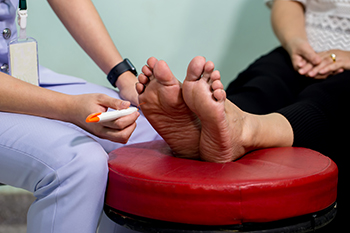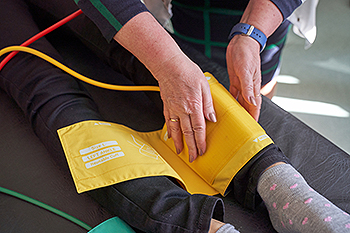Connect With Us
Blog

Your feet endure daily strain, often leading to soreness and discomfort. Home remedies like foot baths with Epsom salts, stretching exercises, and massages can offer temporary relief. In addition, strengthening routines, and wearing properly fitting footwear can help alleviate symptoms. However, if foot pain persists or worsens, or if you experience symptoms such as swelling, numbness, or difficulty walking, it may be time to consult a podiatrist. Individuals with diabetes should be particularly vigilant, as any foot pain or abnormalities may indicate serious complications that require immediate medical attention. Furthermore, if you have flu-like symptoms in combination with foot pain, an open wound in the foot, or suspect a broken bone, seeking help is essential. A podiatrist can accurately diagnose and treat underlying conditions, such as plantar fasciitis, neuropathy, or stress fractures. They also can provide personalized treatment plans, including custom orthotics for optimal support and alignment. By seeking timely professional help, you can address the root cause of your foot pain and prevent future discomfort. If your sore feet worsen, it is suggested that you schedule an appointment with a podiatrist for an exam.
Foot Pain
Foot pain can be extremely painful and debilitating. If you have a foot pain, consult with one of our podiatrists from Comprehensive Foot & Ankle Center. Our doctors will assess your condition and provide you with quality foot and ankle treatment.
Causes
Foot pain is a very broad condition that could be caused by one or more ailments. The most common include:
- Bunions
- Hammertoes
- Plantar Fasciitis
- Bone Spurs
- Corns
- Tarsal Tunnel Syndrome
- Ingrown Toenails
- Arthritis (such as Gout, Rheumatoid, and Osteoarthritis)
- Flat Feet
- Injury (from stress fractures, broken toe, foot, ankle, Achilles tendon ruptures, and sprains)
- And more
Diagnosis
To figure out the cause of foot pain, podiatrists utilize several different methods. This can range from simple visual inspections and sensation tests to X-rays and MRI scans. Prior medical history, family medical history, and any recent physical traumatic events will all be taken into consideration for a proper diagnosis.
Treatment
Treatment depends upon the cause of the foot pain. Whether it is resting, staying off the foot, or having surgery; podiatrists have a number of treatment options available for foot pain.
If you have any questions, please feel free to contact our offices located in Lehigh Ave and Nazareth Hospital in Philadelphia, Collegeville Darby, and Langhorne, PA . We offer the newest diagnostic and treatment technologies for all your foot care needs.

Multiple sclerosis, or MS, is a chronic autoimmune disease affecting the central nervous system, disrupting communication between the brain and the rest of the body. It occurs when the immune system mistakenly attacks the protective myelin sheath surrounding nerve fibers, leading to inflammation, scarring, and nerve damage. MS can cause a wide range of symptoms, including fatigue, weakness, numbness, coordination difficulties, and cognitive impairment, significantly impacting quality of life. Foot symptoms such as numbness, tingling, weakness, or difficulty in walking are common manifestations of MS. If you have MS and are experiencing foot symptoms, it is strongly suggested that you schedule an appointment with a podiatrist who can provide personalized care to help you maintain optimal foot health and overall well-being.
When dealing with systemic disease of the feet, it is extremely important to check the affected areas routinely so that any additional problems are caught quickly. If you have any concerns about your feet and ankles contact one of our podiatrists from Comprehensive Foot & Ankle Center. Our doctors will assist you with all of your podiatric needs.
Systemic Diseases of the Feet
Systemic diseases affect the whole body, and symptoms usually are displayed in the feet. This condition can make a patient’s ability to walk unbearable. Systemic diseases include gout, diabetes mellitus, neurological disorders, and arthritis.
Gout – is caused by an excess of uric acid in the body. Common symptoms include pain, inflammation, and redness at the metatarsal/phalangeal joint of the base big toe. Gout can be treated by NSAIDs to relieve pain and inflammation, and other drugs that lower the acid levels in the body.
Diabetes mellitus – is an increase in the level of blood sugar that the body cannot counteract with its own insulin. Failure to produce enough insulin is a factor in Diabetes.
Diabetes of the Feet
Diabetic Neuropathy – may lead to damaged nerves and affect the feet through numbness and loss of sensation.
Peripheral Vascular Disease – can restrict the blood flow to the feet, and often times lead to amputation of the feet.
If you have any questions please feel free to contact our offices located in Lehigh Ave and Nazareth Hospital in Philadelphia, Collegeville Darby, and Langhorne, PA . We offer the newest diagnostic and treatment technologies for all your foot and ankle needs.
 Peripheral artery disease, or PAD, is a condition where the arteries that supply blood to the legs and feet become narrowed or blocked due to plaque buildup. This decreases blood flow to the lower extremities. Symptoms of PAD can vary but often include leg pain or cramping while walking or climbing stairs, which typically eases with rest. Some people may also experience numbness, weakness, or a cold sensation in their lower legs or feet. Changes in the color of the skin or slower growth of the nails may also occur. In more severe cases, PAD can lead to wounds or ulcers on the feet or legs that heal poorly or not at all. Getting diagnosed early is important because PAD can be a sign of more widespread arterial disease, which could increase the risk of heart attack or stroke. Early treatment can help manage symptoms, improve mobility, and reduce the risk of more serious complications. It is suggested that you consult a podiatrist, or foot doctor, for help if you are experiencing any symptoms that sound like PAD.
Peripheral artery disease, or PAD, is a condition where the arteries that supply blood to the legs and feet become narrowed or blocked due to plaque buildup. This decreases blood flow to the lower extremities. Symptoms of PAD can vary but often include leg pain or cramping while walking or climbing stairs, which typically eases with rest. Some people may also experience numbness, weakness, or a cold sensation in their lower legs or feet. Changes in the color of the skin or slower growth of the nails may also occur. In more severe cases, PAD can lead to wounds or ulcers on the feet or legs that heal poorly or not at all. Getting diagnosed early is important because PAD can be a sign of more widespread arterial disease, which could increase the risk of heart attack or stroke. Early treatment can help manage symptoms, improve mobility, and reduce the risk of more serious complications. It is suggested that you consult a podiatrist, or foot doctor, for help if you are experiencing any symptoms that sound like PAD.
Peripheral artery disease can pose a serious risk to your health. It can increase the risk of stroke and heart attack. If you have symptoms of peripheral artery disease, consult with one of our podiatrists from Comprehensive Foot & Ankle Center. Our doctors will assess your condition and provide you with quality foot and ankle treatment.
Peripheral artery disease (PAD) is when arteries are constricted due to plaque (fatty deposits) build-up. This results in less blood flow to the legs and other extremities. The main cause of PAD is atherosclerosis, in which plaque builds up in the arteries.
Symptoms
Symptoms of PAD include:
- Claudication (leg pain from walking)
- Numbness in legs
- Decrease in growth of leg hair and toenails
- Paleness of the skin
- Erectile dysfunction
- Sores and wounds on legs and feet that won’t heal
- Coldness in one leg
It is important to note that a majority of individuals never show any symptoms of PAD.
Diagnosis
While PAD occurs in the legs and arteries, Podiatrists can diagnose PAD. Podiatrists utilize a test called an ankle-brachial index (ABI). An ABI test compares blood pressure in your arm to you ankle to see if any abnormality occurs. Ultrasound and imaging devices may also be used.
Treatment
Fortunately, lifestyle changes such as maintaining a healthy diet, exercising, managing cholesterol and blood sugar levels, and quitting smoking, can all treat PAD. Medications that prevent clots from occurring can be prescribed. Finally, in some cases, surgery may be recommended.
If you have any questions, please feel free to contact our offices located in Lehigh Ave and Nazareth Hospital in Philadelphia, Collegeville Darby, and Langhorne, PA . We offer the newest diagnostic and treatment technologies for all your foot care needs.

